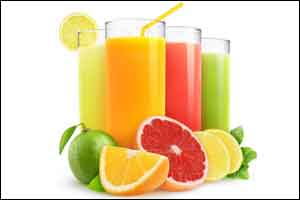- Home
- Editorial
- News
- Practice Guidelines
- Anesthesiology Guidelines
- Cancer Guidelines
- Cardiac Sciences Guidelines
- Critical Care Guidelines
- Dentistry Guidelines
- Dermatology Guidelines
- Diabetes and Endo Guidelines
- Diagnostics Guidelines
- ENT Guidelines
- Featured Practice Guidelines
- Gastroenterology Guidelines
- Geriatrics Guidelines
- Medicine Guidelines
- Nephrology Guidelines
- Neurosciences Guidelines
- Obs and Gynae Guidelines
- Ophthalmology Guidelines
- Orthopaedics Guidelines
- Paediatrics Guidelines
- Psychiatry Guidelines
- Pulmonology Guidelines
- Radiology Guidelines
- Surgery Guidelines
- Urology Guidelines
Intake of even naturally sweet drinks tied to type 2 diabetes: Diabetes Care

USA: Diet is known to play an important role in the management of many diseases, including chronic diseases such as cancer, diabetes, and cardiovascular disease. Now, a recent study has found the association between sugary beverages or artificially sweetened beverages (ASBs) and type 2 diabetes.
The study, published in the Diabetes Care journal, found that people who increase their consumption of sodas, juices and other sweet drinks over time are more likely to develop diabetes than those who don't.
According to WHO, diabetes is a chronic disease that occurs either when the pancreas does not produce enough insulin or when the body cannot effectively use the insulin it produces. Insulin is a hormone that regulates blood sugar. Type 2 diabetes (formerly called non-insulin-dependent, or adult-onset) results from the body’s ineffective use of insulin. It comprises the majority of people with diabetes around the world and is largely the result of excess body weight and physical inactivity.
Jean-Philippe Drouin-Chartier, a nutrition researcher at the Harvard T.H. Chan School of Public Health in Boston, and colleagues evaluated the associations of long-term changes in consumption of sugary beverages (including sugar-sweetened beverages and 100% fruit juices) and artificially sweetened beverages (ASBs) with subsequent risk of type 2 diabetes.
For the purpose, the researchers followed up 76,531 women in the Nurses’ Health Study (1986–2012), 81,597 women in the Nurses’ Health Study II (1991–2013), and 34,224 men in the Health Professionals’ Follow-up Study (1986–2012) over two decades.
Changes in beverage consumption (in 8-ounce serving/day) were calculated from food frequency questionnaires administered every 4 years.
Also Read: 100% fruit juice a healthy beverage? No, high consumption can lead to death: JAMA Study
Key findings of the study include:
- None of the participants had diabetes at the start of the study; by the end, almost 12,000 people had developed the disease.
- After accounting for how much people weighed and their overall eating patterns, researchers found that those who increased their total consumption of sugary drinks by a half serving a day over four years were 16% more likely to develop diabetes over the next four-year period.
- With the same daily half-serving increase in artificially-sweetened drinks, the odds went up 18%.
- When people replaced sodas, juices and other sugary beverages with other kinds of drinks, their risk of developing diabetes went down.
- Replacing one serving a day of sugary drinks with water, coffee or tea, was associated with a 2% to 10% lowering of diabetes risk.
Also Read: High intake of fruit juice and sugar loaded beverages tied to gout
“Even though consumption of 100% fruit juices has been considered a healthy alternative to sugar-sweetened beverages because of the vitamins and minerals in fruit juices, they typically contain similar amounts of sugar and calories as sugar-sweetened beverages,” said Drouin-Chartier told Reuters Health.
The study results “raise concerns about the negative health effects of sugary beverages, regardless of whether the sugar is added or naturally occurring,” Drouin-Chartier said.
It’s possible that diet sodas and other artificially-sweetened drinks were tied to higher diabetes risk because people switched to these beverages after they developed diabetes or realized they were on track to get the disease, the study team acknowledges in Diabetes Care.
More Information: Changes in Consumption of Sugary Beverages and Artificially Sweetened Beverages and Subsequent Risk of Type 2 Diabetes: Results From Three Large Prospective U.S. Cohorts of Women and Men published in journal Diabetes Care.
DOI: https://doi.org/10.2337/dc19-0734
Journal Information: Diabetes Care

Disclaimer: This site is primarily intended for healthcare professionals. Any content/information on this website does not replace the advice of medical and/or health professionals and should not be construed as medical/diagnostic advice/endorsement or prescription. Use of this site is subject to our terms of use, privacy policy, advertisement policy. © 2020 Minerva Medical Treatment Pvt Ltd